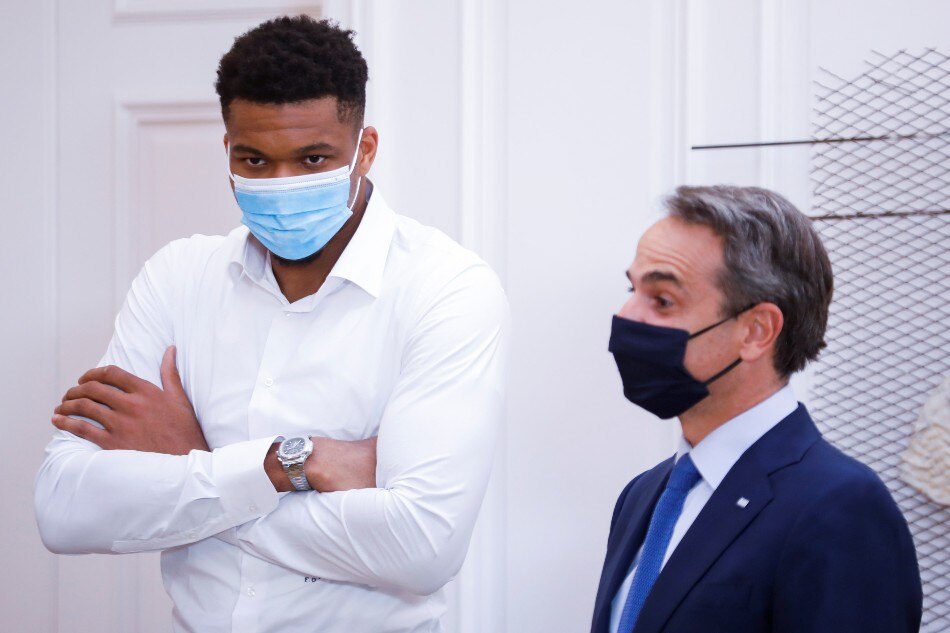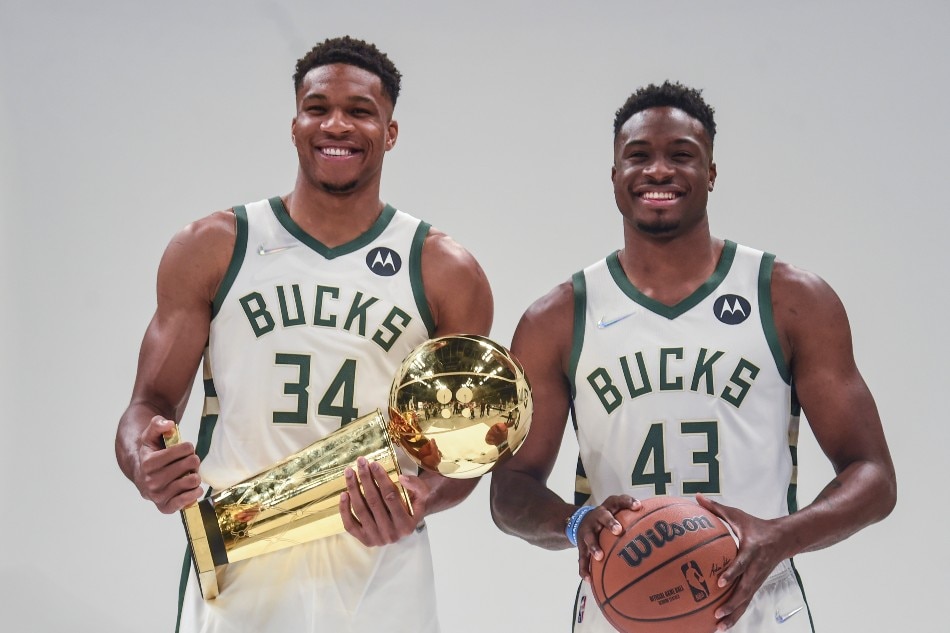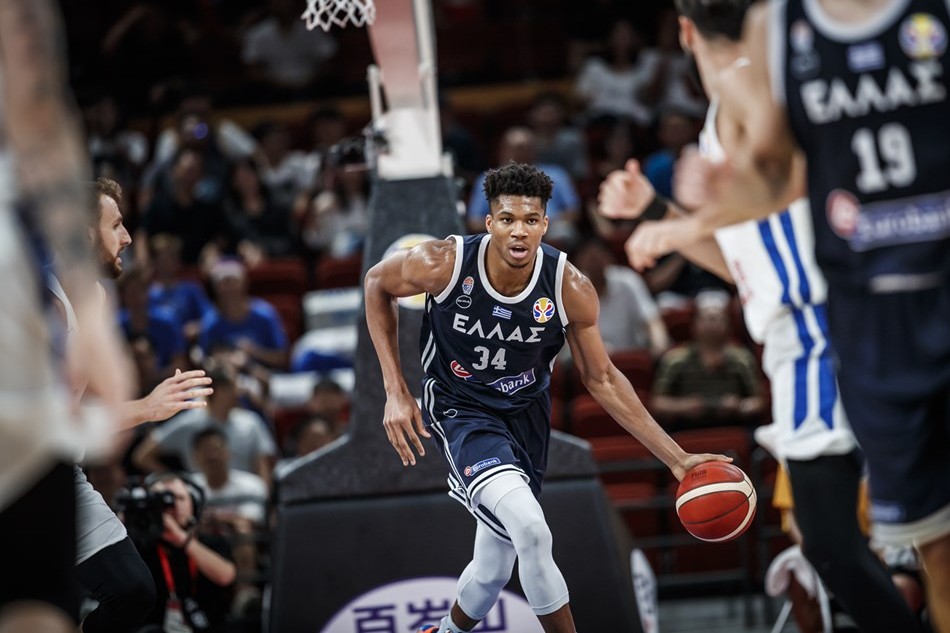NBA: As Greece fetes Giannis Antetokounmpo, others like him suffer | ABS-CBN

Welcome, Kapamilya! We use cookies to improve your browsing experience. Continuing to use this site means you agree to our use of cookies. Tell me more!
NBA: As Greece fetes Giannis Antetokounmpo, others like him suffer
NBA: As Greece fetes Giannis Antetokounmpo, others like him suffer
John HADOULIS,
Agence France-Presse
Published Oct 03, 2021 09:09 AM PHT
ATHENS, Greece -- The sun was barely out in Greece in July when Prime Minister Kyriakos Mitsotakis jumped on Twitter to congratulate newly-crowned Greek-Nigerian NBA champion Giannis Antetokounmpo of the Milwaukee Bucks.
ATHENS, Greece -- The sun was barely out in Greece in July when Prime Minister Kyriakos Mitsotakis jumped on Twitter to congratulate newly-crowned Greek-Nigerian NBA champion Giannis Antetokounmpo of the Milwaukee Bucks.
"Incredible Yannis! Greeks everywhere celebrate!" the avid basketball fan tweeted minutes after the final buzzer sounded across the Atlantic, using a lesser used version of the star's first name.
"Incredible Yannis! Greeks everywhere celebrate!" the avid basketball fan tweeted minutes after the final buzzer sounded across the Atlantic, using a lesser used version of the star's first name.
Nicknamed the "Greek Freak" and one of the country's top global ambassadors, Antetokounmpo has reached the pinnacle of sporting success after overcoming a poverty-stricken childhood familiar to tens of thousands of migrant children growing up in Greece.
Nicknamed the "Greek Freak" and one of the country's top global ambassadors, Antetokounmpo has reached the pinnacle of sporting success after overcoming a poverty-stricken childhood familiar to tens of thousands of migrant children growing up in Greece.
The son of Nigerian immigrants who arrived in Athens in 1991 seeking a better future, he was born and raised in working-class suburbs of the Greek capital, selling trinkets with his family to make a living.
The son of Nigerian immigrants who arrived in Athens in 1991 seeking a better future, he was born and raised in working-class suburbs of the Greek capital, selling trinkets with his family to make a living.
ADVERTISEMENT
But whereas the two-time NBA Most Valuable Player catapulted out of obscurity, few migrant children in Greece are as fortunate. Onerous paperwork and tough laws make it difficult for many migrants to get nationality and become full members of society.
But whereas the two-time NBA Most Valuable Player catapulted out of obscurity, few migrant children in Greece are as fortunate. Onerous paperwork and tough laws make it difficult for many migrants to get nationality and become full members of society.
"Under normal circumstances, Giannis would not have received Greek citizenship," says Vassilis Papastergiou, an advocacy officer for the Greek Council for Refugees, one of the country's main rights groups.
"Under normal circumstances, Giannis would not have received Greek citizenship," says Vassilis Papastergiou, an advocacy officer for the Greek Council for Refugees, one of the country's main rights groups.
"He received honorary citizenship when he was drafted" into the NBA by the Bucks, he said.
"He received honorary citizenship when he was drafted" into the NBA by the Bucks, he said.
Greece has for decades run a tight ship on naturalisation and attitudes towards foreigners hardened after the European migrant crisis of 2015, when more than 800,000 asylum seekers -- mainly Afghans, Iraqis and Syrians -- landed on Greek islands.
Greece has for decades run a tight ship on naturalisation and attitudes towards foreigners hardened after the European migrant crisis of 2015, when more than 800,000 asylum seekers -- mainly Afghans, Iraqis and Syrians -- landed on Greek islands.
Mitsotakis' conservative government, which came to power in 2019, has further tightened laws and bolstered border patrols in a bid to deter fresh arrivals.
Mitsotakis' conservative government, which came to power in 2019, has further tightened laws and bolstered border patrols in a bid to deter fresh arrivals.
In 2020, more than 9,000 children received citizenship, down from more than 21,000 in 2018, according to the interior ministry.
In 2020, more than 9,000 children received citizenship, down from more than 21,000 in 2018, according to the interior ministry.
Only children born in Greece to at least one parent legally in the country for the previous five years are entitled to citizenship at birth.
Only children born in Greece to at least one parent legally in the country for the previous five years are entitled to citizenship at birth.
Otherwise, they have to complete six years of secondary school, or nine years of primary and secondary school, or obtain a Greek university degree.
Otherwise, they have to complete six years of secondary school, or nine years of primary and secondary school, or obtain a Greek university degree.
As Antetokounmpo's parents were in Greece illegally during his childhood, he could only apply after completing school and then wait several years for his application to be examined.
As Antetokounmpo's parents were in Greece illegally during his childhood, he could only apply after completing school and then wait several years for his application to be examined.
"A child arriving from Nigeria today, the next Antetokounmpo, would probably have been stopped at the border, or have its application rejected," says Papastergiou.
"A child arriving from Nigeria today, the next Antetokounmpo, would probably have been stopped at the border, or have its application rejected," says Papastergiou.
- 'Still a migrant' -
- 'Still a migrant' -
Nikos-Deji Odubitan was born in Greece to Nigerian parents. Despite growing up here, the 40-year-old founder and manager of Generation 2.0, a non-profit providing legal and career counselling to migrants and refugees, says he is "still considered a migrant".
Nikos-Deji Odubitan was born in Greece to Nigerian parents. Despite growing up here, the 40-year-old founder and manager of Generation 2.0, a non-profit providing legal and career counselling to migrants and refugees, says he is "still considered a migrant".
Odubitan told AFP he was "theoretically fortunate" to have secured successive one-year residence permits to complete his medical engineering degree.
Odubitan told AFP he was "theoretically fortunate" to have secured successive one-year residence permits to complete his medical engineering degree.
In contrast, his father completed a law degree in Thessaloniki but was never allowed to practice, because he could not get citizenship.
In contrast, his father completed a law degree in Thessaloniki but was never allowed to practice, because he could not get citizenship.
"When you reach adulthood you have two options (towards legalization): study or work. Some have been unable to find either," said Odubitan, who has been waiting nearly four years for his citizenship application to be processed.
"When you reach adulthood you have two options (towards legalization): study or work. Some have been unable to find either," said Odubitan, who has been waiting nearly four years for his citizenship application to be processed.
- 'Hypocrisy' -
- 'Hypocrisy' -
In September, Mitsotakis was accused by the leftist opposition Syriza party of "hypocrisy" when he invited Antetokounmpo's mother and younger brother Alex to his office to receive Greek citizenship.
In September, Mitsotakis was accused by the leftist opposition Syriza party of "hypocrisy" when he invited Antetokounmpo's mother and younger brother Alex to his office to receive Greek citizenship.
Two days earlier, a lawmaker in the prime minister's party sparked uproar by re-tweeting a post claiming that the number of children with apparently non-Greek surnames at an Athens nursery was "shockingly" high.
Two days earlier, a lawmaker in the prime minister's party sparked uproar by re-tweeting a post claiming that the number of children with apparently non-Greek surnames at an Athens nursery was "shockingly" high.
Syriza pointed out that Antetokounmpo "could have been among" those names.
Syriza pointed out that Antetokounmpo "could have been among" those names.
Mitsotakis was also heavily criticized in August after he appointed as health minister a former far-right lawyer who called for "hellish" deterrents for migrants in Greece.
Mitsotakis was also heavily criticized in August after he appointed as health minister a former far-right lawyer who called for "hellish" deterrents for migrants in Greece.
The government now has three former far-right politicians in leading cabinet posts, including the interior minister who oversees naturalization procedures.
The government now has three former far-right politicians in leading cabinet posts, including the interior minister who oversees naturalization procedures.
- 'They don't really care' -
- 'They don't really care' -
Jonathan, who agreed to speak to AFP under a pseudonym, has been waiting for two years for his Greek citizenship application to be approved.
Jonathan, who agreed to speak to AFP under a pseudonym, has been waiting for two years for his Greek citizenship application to be approved.
The 23-year-old from Benin was attacked and stabbed by three men in Athens in July. He has now left the capital and found work at a bar on an island.
The 23-year-old from Benin was attacked and stabbed by three men in Athens in July. He has now left the capital and found work at a bar on an island.
"I don't think they really care, it's just for the sake of appearances," he says of the government's invitation to the Antetokounmpo family.
"I don't think they really care, it's just for the sake of appearances," he says of the government's invitation to the Antetokounmpo family.
Antetokounmpo makes no secret of his Nigerian heritage -- but doesn't usually mention it when speaking to media in Greece.
Antetokounmpo makes no secret of his Nigerian heritage -- but doesn't usually mention it when speaking to media in Greece.
"We have always felt Greek," Antetokounmpo said after last month's naturalization ceremony.
"We have always felt Greek," Antetokounmpo said after last month's naturalization ceremony.
In 2020, when he told Bleacher Report about how difficult it was to grow up in "a land of whites," it sparked immediate backlash in Greece, with a refugee education coordinator calling him a "monkey".
In 2020, when he told Bleacher Report about how difficult it was to grow up in "a land of whites," it sparked immediate backlash in Greece, with a refugee education coordinator calling him a "monkey".
Antetokounmpo has donated food in his childhood neighborhood, runs an academy to support vulnerable youths, and recently offered funds to Greek wildfire victims.
Antetokounmpo has donated food in his childhood neighborhood, runs an academy to support vulnerable youths, and recently offered funds to Greek wildfire victims.
But Odubitan says the NBA star could do more to shed light on the plight of second-generation migrants in Greece.
But Odubitan says the NBA star could do more to shed light on the plight of second-generation migrants in Greece.
"Personally, what saddens me is that he is not aware of his influence," says Odubitan.
"Personally, what saddens me is that he is not aware of his influence," says Odubitan.
"If Giannis thinks that talking less about his origins and his Blackness will improve his image in Greece, he is wrong... nothing he says will make him less Greek."
"If Giannis thinks that talking less about his origins and his Blackness will improve his image in Greece, he is wrong... nothing he says will make him less Greek."
© Agence France-Presse
© Agence France-Presse
ADVERTISEMENT
ADVERTISEMENT




